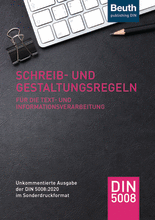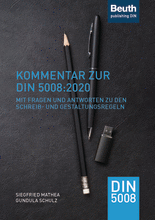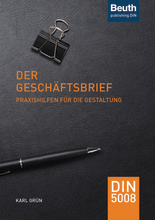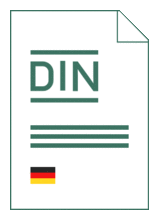
Gender-sensitive language in everyday office life
The need for gender-sensitive language is growing: E-mails, business letters, annual reports, minutes or presentations should not exclude any person, but should take into account the diversity of our society. The current edition of DIN 5008, which summarizes the rules for office communication in German, has also included two notes on this. Anyone who wants to be inclusive can now also refer to the current standard.
Johanna Usinger has been working for many years on solutions for an inclusive language. On her web page geschicktgendern.de she has compiled tips and built up a dictionary of alternative formulations in German, which is constantly being added to. We spoke with the expert about gender equality in language and examples of successful implementation in everyday life.
The fact that the German language is dominated by masculine forms did not seem to be an issue for many people for decades. That has changed noticeably: In the media, and in business communication, there is an increasing desire to formulate texts in a gender-appropriate or gender-neutral way. How did this actually come about, and what goals are associated with it?
Johanna Usinger: Perhaps because it is long overdue to include half of society? In 2018, the German Federal Constitutional Court ruled that a third option for registration must be offered in the civil status register in addition to the male and female genders. This has certainly contributed to the fact that the use of the asterisk or the underscore [in German] to include other genders has become better known and is increasingly accepted.
However, I believe that the topic has been current for decades and has moved many people for a very long time. Solutions such as double nouns, slashes and neutral forms have long since become part of our everyday language in some contexts: It is natural for us to say "Dear Sir or Madam" and not just to greet the "Sirs". Neutral terms such as "Studierende” (a neutral form for student) or “Lehrkraft” (a neutral form for teacher) also enjoy social acceptance and are used, albeit often unconsciously, as gender-neutral terms.
One objection that is often heard is: A form like "Lehrer” (teacher) is not an ordinary masculine, but a generic one that refers to all teachers and thus also "includes" women. Why should we also avoid such a masculine?
Johanna Usinger: Various studies show that women and people of other genders are less included when only the masculine form is used in language.
I like this little story I once picked up somewhere:
Two doctors (masculine form) are sitting and talking in a bar. One says to the other: “Phew, what a hard week, I transplanted three hearts. How was it for you?” The other answers: “Oh, it was a quiet week. I’m not allowed to operate as I am pregnant.
I guess we all stumble over the last statement because we imagined two men and not a woman and a man.
Mentioning women and other genders also has concrete implications for our behaviour: A study shows that children are more likely to feel confident about taking up certain professions if they are spoken of [in German] in the double form (masculine and feminine), that is: Ärztinnen (doctor, fem.) and Ärzte (doctor, masc.), Dachdeckerinnen (roofer, fem.) and Dachdecker (roofer, masc.). In concrete terms, gender-sensitive language allows for greater freedom of thought, action and behaviour.
When gendering texts in German, it is often a matter of referring to people. In addition to neutral forms (Teilnehmende = participants, neutral), paired forms are also possible (Teilnehmerinnen (participants, fem.) und Teilnehmer (participants, masc.). Then there is the option of indicating gender with special characters. DIN 5008, the standard for office communication, mentions the asterisk (*) and the underscore (_) in this context, but also allows for other possibilities. Why is it useful to use such signs at all?
Most guidebooks and institutions recommend the use of neutral terms such as Abteilungsleitung (department head), Redepult (lectern instead of speaker), ärztliches Fachpersonal (medical professional) or other clever ways such as rephrasing sentences: “Holen Sie sich bei Fragen ärztlichen Rat oder erkundigen Sie sich in Ihrer Apotheke” (If you have any questions, seek medical advice or ask at your pharmacy), instead of “Fragen Sie Ihren Arzt oder Apotheker” (Ask your doctor (masc. form) or pharmacist (masc. form)). Or the direct form of address: “Stellen Sie Ihren Antrag bis zum Monatsende“ (Submit your application by the end of the month) instead of “Antragsteller müssen die Unterlagen bis zum Monatsende einreichen” (Applicants (masc. form) must submit the documents by the end of the month). Or using the plural: “Alle Angestellten haben Anspruch auf einen Homeoffice-Tag“ (All employees (neutral) are entitled to a home office day) instead of “Jeder Angestellte hat den Anspruch auf einen Homeoffice-Tag“ (Every employee (masc. form) has the right to a home office day). Neutral spellings often work with the person being described in more detail: “Wir suchen eine Person für die Sachbearbeitung“ (We are looking for a person for clerical work) instead of: “Wir suchen einen Sachbearbeiter“ (We are looking for a clerk (masc. form)).
Only if there is no alternative should spellings such as double naming, the asterisk or the underscore be used. The advantage of using asterisks or underscores over double naming is that it also addresses people who do not want to or cannot assign themselves to either the female or the male gender. However, the Council for German Orthography has not yet decided on a binding special character and there is a lot of experimentation going on at the moment. Some would like to put an exclamation mark (Chef!nnen) (Head) so that women do not look like appendages, others use the i with two dots (Chefïnnen) (Head), which is also common in French and Catalan. I have also come across the colon more often recently (Programmierer:innen = programmers). This has three advantages: It is slim and interrupts the word less than an asterisk or underscore, it names people who are not or do not want to be female or male, and screen readers for blind people read it as a pause - so gender-equitable language is also accessible.

How are articles (definite and indefinite) used in such formulations?
There are no binding regulations on this yet. But we can draw on the experience of people who have been using underscores and asterisks for decades: As a rule, articles and pronouns are also used with an asterisk/underscore/double colon: “Jede:r Büromitarbeiter:in bekommt einen eigenen PC-Zugang” (Every (fem. and masc.) office employee (fem. and masc.) gets their own PC access). “Die/der Angestellte darf ihren/seinen Hund mit ins Büro bringen” (The (fem. and masc.) employee may bring their (fem. and masc.) dog to the office.). Sie*er muss Rücksprache mit den Kolleg*innen halten (She/he must consult with the colleagues (masc. and fem.)).
How do you pronounce the use of an asterisk for gender equality?
The gender asterisk is pronounced like a very short pause before the [feminine] ending "-innen". Maybe it sounds a bit unusual at first, but I think you can get used to it quickly. This can already be heard occasionally on TV shows such as “Anne Will“ or “heute journal“.
A common stumbling block in the implementation of gender-equitable language is the form of address. Are there any simple rules of thumb for this - for example, if the gender of the person being addressed is not known?
If it is a group of people, I can choose one of these variants instead of "Sehr geehrte Damen und Herren” (Dear Sir or Madam), for example: “Guten Tag“ (Good day), “Sehr geehrtes Team der Muster GmbH“ (Dear [company name] team), “Sehr geehrter Kundenservice“(Dear customer service) or “Sehr geehrte Beschäftigte” (Dear employees). Because often I at least know the target group I want to address. For individuals, I can put a "good day" in front of the full name or use the asterisk.
Do gender-sensitive formulations make our language more complicated and do they disrupt the flow of reading?
When I choose gender-sensitive language, it is out of a conviction that through language I can make the world a little fairer and contribute to gender equality.
Objections that gender-equitable language is complicated and disturbs the flow of reading are formal arguments. Apart from that, we are used to complicated language in many other contexts, such as bureaucratic German or in contracts. In contrast, an asterisk or the underscore is not a particularly difficult challenge.
Besides special characters, however, there are also clever alternatives that do not disturb the flow of the text: Rephrasing, neutral forms, use of the plural or direct address. Ideally, people who read a text do not even notice that it is written in a gender-appropriate way because gender does not matter. If on a promenade [a sign says] “Radfahrer bitte absteigen” (cyclists (masc. form) please dismount), it is not relevant whether a woman, man, child, another person or a robot is on the bike. So why not just say "Fahrräder bitte schieben” (push bikes please)? That sounds much friendlier, too.

Publication DIN Media Praxis 2020-04
Schreib- und Gestaltungsregeln für die Text- und Informationsverarbeitung19.90 EUR VAT included
18.60 EUR VAT excluded

Publication DIN Media Kommentar 2020-06
Kommentar zur DIN 5008:2020from 24.90 EUR VAT included
from 23.27 EUR VAT excluded

from 19.90 EUR VAT included
from 18.60 EUR VAT excluded

Standard [CURRENT] 2020-03
DIN 5008:2020-03from 231.40 EUR VAT included
from 216.26 EUR VAT excluded

from 91.80 EUR VAT included
from 85.79 EUR VAT excluded

from 63.80 EUR VAT included
from 59.63 EUR VAT excluded

Am DIN-Platz | Burggrafenstraße 6
10787 Berlin
- Phone : +49 30 58885700-07
- E-Mail : International@dinmedia.de
